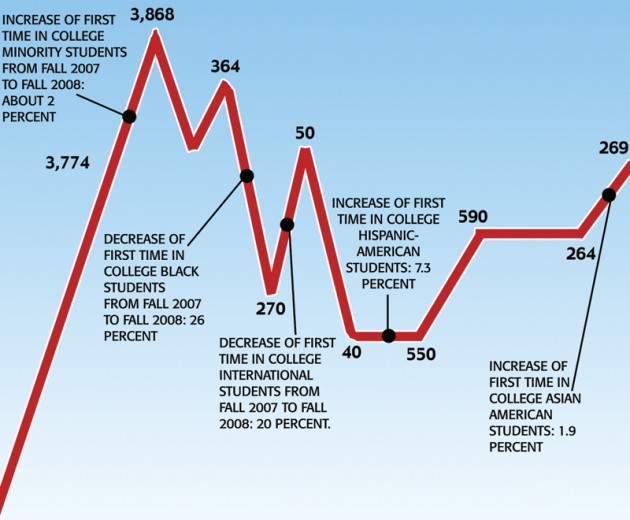Some minority enrollments decline at USF

More minority students are enrolled at USF this year, but some minorities are coming to the University in smaller numbers.
The number of first time in college (FTIC) black students and the number of FTIC international students dropped by 26 and 20 percent, respectively.
Despite this, the number of minority students at USF is on an upswing, though the increase this year — 2.1 percent this fall — is less than the 2.9 increase from fall 2006 to fall 2007.
This fall, the University enrolled 3,868 FTIC minority students, a 2 percent increase from last year’s 3,774.
Leellen Brigman, associate vice president of enrollment planning and management, credits the drop in minority students to budget cuts.
In October, Brigman said, the body that controls Florida’s public colleges and universities — the Board of Governors — told USF that “We had to limit our freshman student credit hours.”
That prompted the University to admit no more students than the previous year because, Brigman said, the number of credit hours available for freshman would stay the same.
Brigman said USF hasn’t changed its admissions standards, making it harder to get into the University. Also, there was a very large increase in black students, she said, making this fall’s decrease look dramatic.
All universities are seeing a decline in minority students, she said.
Brigman said this might be because some minority students went to Florida Agricultural and Mechanical University (FAMU) — at one time placed on probation by a college-accrediting body — to bolster FAMU’s credentials.
“If someone is worried whether or not a university will survive, they may choose to go to another institution,” she said.
This year, FAMU’s number of black students increased by 23 percent, Brigman said.
Other universities are seeing declines, too. At the University of Florida, black students made up 13 percent of the student population in 2007, this year it’s 10 percent, said Aaron Hoover, a writer for the UF News Bureau.
At USF, Brigman said, programs like the Freshman Summer Institute (FSI) and Student Support Services (SSS) — initiatives targeted toward FTIC freshman who are the first in their family to attend college — experienced a decline in students.
The programs are open to all ethnic groups but are more heavily populated by minority groups, said Mack Davis, the director of the FSI and SSS.
Davis said minorities collectively make up 84 percent of the both programs.
Brigman said cutting back on programs such as FSI and SSS can also affect the number of minority students the University sees admitted each year.
“We had to cut resources in our enrollment services, admissions, financial aid, registrars office and scholarship resources,” she said. “One of those things we did reduce were some of outreach programs that would reach more ethnic populations that are not traditional in college.”
Though those numbers are down this semester, Brigman said the University has been increasing the number of minority students admitted each year. Hispanic-American students have increased by 7.3 percent and Asian-American students have increased by 1.9 percent.
According to University records, the overall diversity of the student body, including undergraduate, graduate and non-degree seeking students, increased by 2.9 percent in the fall of 2007 and 2.1 percent this fall.
“We’ve continued to grow and the number of diverse students has increased,” Brigman said. “We don’t recruit just one minority group, we reach out to groups who have not had the opportunity to go to college in the past. That’s part of our basic mission as a public university.”
Some students feel the decline in African American students isn’t good for the University.
Lee Williams, a black sophomore studying pre-law, used to work in the admissions department at USF. He said the system isn’t necessarily fair to all students.
“By not having a decent level of diversity of African Americans on campus, you’ve taken away the college experience from other races,” he said.
Shana Geary, a white sophomore majoring in biomedical science, reacted similarly to the statistics.
“It’s a shame the numbers are down because USF is known for its diversity,” she said.
Danielle Coupet, a black sophomore majoring in economics, said that the University cannot be solely blamed, however.
“Less and less African Americans are going to college,” she said.
Director of Admissions Robert Spatig said that regardless of these statistics, USF remains diverse.
“Diversity at USF is much broader than a black and white issue,” he said. “Our goal is to admit students who are going to persist and graduate.”






